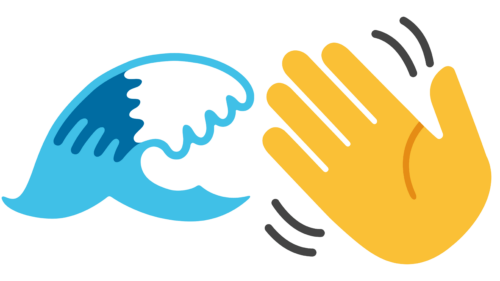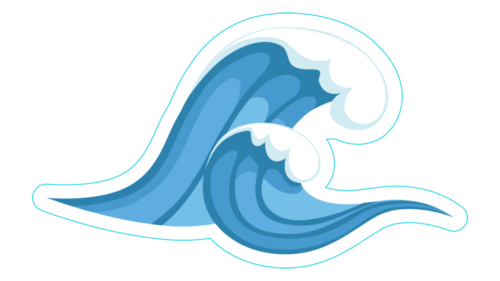Emoji is a language of ideograms and emoticons used in electronic messages and web pages. This graphic language, which uses combinations of pictures instead of words, originated in Japan and spread all over the world. Many images from the Emoji set are not obvious at first glance, while others, on the contrary, are difficult to interpret in several meanings.
In general, some of the icons in modern Emoji have a symbolic meaning for the Japanese culture, which gave birth to this language of emoticons, but in general it has already spread around the world and is suitable for any of the nationalities.
Today we want to talk about two completely different emoji, which, however, have the same name – The Wave Emoji. This is one of the rare cases when one word stands for two completely different things. Let’s take a closer look at these emoji.
🌊 The Wave emoji was assigned the code U+1F30A, with which it was added to the Places and Travel section of the Unicode 6.0 standard in 2010.
👋 The Waving Hand emoticon was assigned the code U+1F44B, with which it was added to the People and Bodies section of Unicode 6.0 in 2010.
Meaning of the Wave Emoji
It is pointless to talk about the difference between these two emoji, because everything is obvious here: the two Wave Emoji are not interchangeable at all. Let’s analyze each one separately. And let’s start with the most literal one.
🌊 This is a light blue, rather large wave of water, which is primarily associated with the ocean. Also, this emoji represents the sea, traveling, surfing and swimming, and in a more inclusive sense means freedom. The Wave emoji represents water in all its forms and manifestations, the power of the elements. This emoji is very often used by fans of surfing and other water sport disciplines.
👋 And this Wave Emoji variant is much more common as it has no rigid stylistic framework. This waving hand is a sign of greeting or farewell that looks appropriate in any message. Also often this emoticon can be used to attract attention. Waving hand is an emoji that does not have any negative meanings, which means that it is suitable for any correspondence.
The Use of the Wave Emoji
In terms of usage, the Wave 🌊 emoji can be used in the context of vacationing at the sea, surfing or swimming. It also represents the love of water in general. But there is a more dramatic side to using this emoji: it can also appear in the context of nature and even disasters such as tsunamis and floods.
And the second Wave Emoji 👋, the one with the yellow palm, is much more versatile. It fits any dialog as a greeting or, on the contrary, goodbye. It is also often found in group chats or heated discussions in social networks, when a person wants to draw attention to his message that has gone unnoticed.
Conclusion
Emoji are not just pictures and emoticons. It’s a universal set of Unicodes. They are also an important part of any correspondence. They are constantly being updated, new and finalized. And today we looked at two emoji with the same name, but different semantic loads. Interestingly, both Wave Emoji were added to the standard Unicode set in the same year, 2010.









